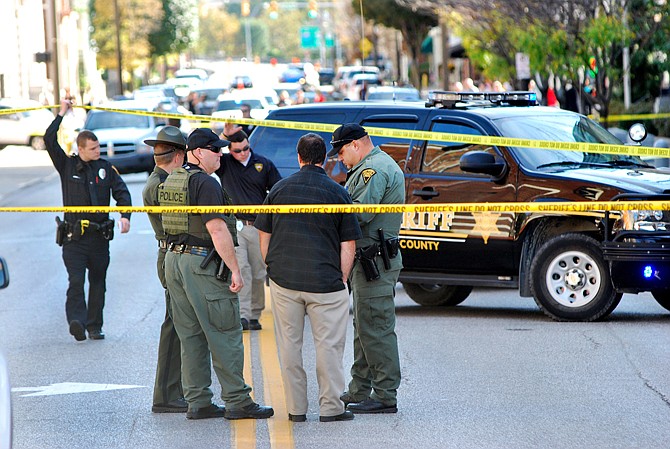WHEELING, W.Va. (AP) - The ex-police officer who opened fire on a federal courthouse in West Virginia was a trained shooter who knew how to kill, yet federal officials said Thursday that he waved people away moments before he started spraying bullets into the glass facade and was later shot dead by law enforcement.
Neither the FBI nor federal prosecutors would discuss the motive for 55-year-old Thomas J. Piccard's assault. But two possible theories emerged as investigators gathered evidence and neighbors revealed that Piccard had recently told them he was dying of cancer.
U.S. Attorney William Ihlenfeld said the building being the target and other evidence he wouldn't specify indicates Piccard "had an anti-government bias."
However, he said, Piccard did not appear to target either individuals or a particular office in the federal building just a few blocks from the Wheeling Police Department where he once worked. Nor was Piccard the target of any active federal investigation.
But acquaintance Mahlon Shields said the thin, sickly looking man who lived across the street had recently told several people in the Presidential Estates trailer park in Bridgeport, Ohio, that he was dying of stomach cancer and planned to spend his final days in Florida.
"I don't think he wanted to hurt people. I think he was afraid to commit suicide," said Shields, whose community is about 5 miles from the courthouse, just across the Ohio River. "I believe it was suicide by cop."
An autopsy will be done as part of the investigation, FBI special supervisory agent John Hambrick said, but he wouldn't confirm whether Piccard was sick.
When asked if there was anything about Piccard's behavior to suggest he might have wanted an officer to shoot him, Hambrick said only, "The possibilities, I'm sure, are numerous. I'm not prepared or qualified to answer that question."
Wheeling Mayor Andy McKenzie said police told him that Piccard had left the force in 2000 after serving more than 10 years. McKenzie said he didn't know the circumstances behind Piccard's departure, but that he didn't have enough service to qualify for retirement.
Police Chief Shawn Schwertfeger said Piccard was armed Wednesday with a rifle and a handgun, but authorities refused to identify the weapons by model or caliber. Hambrick said only that the rifle "easily could be characterized as an assault rifle."
Nor would they say how much ammunition Piccard carried as he stood in a parking lot across Chapline Street and fired as many as two dozen shots, reloading at least once.
Schwertfeger did not say whether Piccard used both weapons during the assault or identify which law enforcement officer at the scene returned fatal fire. But he said that officer is being closely looked after, and that all of those involved in the shooting will get counseling.
Hambrick said officials convened the Thursday afternoon news conference mainly to assure the public there is no evidence of a conspiracy and no continuing threat to the community.
"We feel it's a reasonable conclusion he acted alone," Hambrick said.
Hambrick declined to answer dozens of questions from reporters and suggested there may not be much more information to share until sometime next week.
"We owe it to the investigation to do it in a sterile environment," he said. "We're not going to put evidence out there piecemeal."
The courthouse was technically open Thursday, but security was tight and traffic was light. Workers moved extra metal detectors in and one judge held court, but U.S. marshals would let no one beyond the lobby without an appointment.
Ihlenfeld said he hopes the building will be operating as usual by sometime next week.
Ihlenfeld said he knew Piccard from 1997 until the officer left the force. He said he had no reason to believe his office was targeted. About 40 percent of his staff has been furloughed under the partial government shutdown, so many weren't working when the glass began to shatter.
"There was nothing about my relation with him or anything that I observed in dealing with him ... to cause me to think anything like this would happen," he said.
In the neighborhood where Piccard lived, people wandered past his white and maroon trailer, one panel of metal siding ripped out and tossed aside as broken glass glittered in the grass.
Authorities won't say what prompted them to evacuate the community Wednesday night, but the experience left Lori LeMasters jittery.
" I was shaking," she said. "There could have been a bomb in there. It could have gone off while we was here."
LeMasters had cut Piccard's grass over the past two summers and got paid $10 each time because he didn't have a lawnmower. He wasn't talkative, she said, but he was friendly.
"It's kind of scary. You just don't know what to think anymore," she said. "What's going on in this world?"

